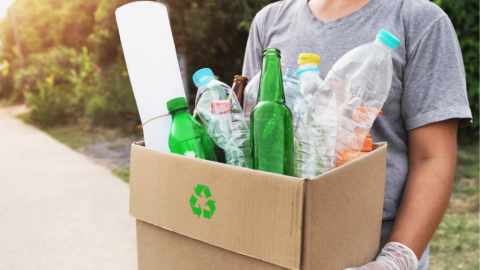Reclaiming the recycling ritual

According to the Pew Research Center, 75 percent of Americans are “particularly concerned” about the environment, but only 20 percent of Americans say they actually live in such a way as to improve the environment on a daily basis.
While some might be confused by these numbers, they make perfect sense to this pastor. My favorite response to the critique that “the church is full of hypocrites” is this: “It’s not full of hypocrites. There’s always room for more!”
In this way, I consider myself the chief of all sinners. I find no shame in admitting that I am a theological hypocrite, regularly failing to live up to the moral ideals I have for myself, but I continue pressing onward towards the goal anyway.
Likewise, I am also an environmental hypocrite. I have seen the facts and figures. I have wept at the thought of the world that I will leave for my children and grandchildren. I have marched with the protestors and shouted at legislators, demanding that “they” change “their” ways. I have ridden my high horse into battle, but I also drove my car less than a mile to church on Sunday instead of walking because I didn’t want the rain and wind to mess up my hair before church.
It is so much easier to be outraged at wasteful plastic packaging than it is to stop buying it altogether. We in the church are seasoned veterans at this kind of mundane hypocrisy, and we have invented a beautiful tool to help us to become the people we want to be. This tool, which is shared by all religious traditions, can also help us to bridge the gap between who we are and who the planet needs us to be.
This tool is ritual.
If you were to visit my church on a Sunday, you would be immediately immersed in the ritual of worship. Every church service that I lead begins with a call-and-response style liturgy. The first part is the call to worship, which might seem silly because we’re already there worshipping. Next is the invocation in which we invite the Holy Spirit into our midst, which might also feel redundant because we believe the Spirit is always with us. Finally, we join together in a prayer of confession, reading words we didn’t write and confessing sins we probably didn’t do—before being assured that our sins were already forgiven before we started. To the outside observer, this must all seem maddeningly unnecessary. But over time, the regular churchgoer often discovers that the power of ritual is in the repetition.
It is an outward and visible sign of the inward and invisible reality which we long for.
Practicing regular, communal rituals helps us to live out our convictions throughout the rest of our lives. I don’t like admitting that I have hurt someone, but practicing public confession every week has oriented the deepest parts of my consciousness toward reconciliation, and made it easier for me to apologize.
Religious rituals are intentional and often carefully crafted, but they aren’t the only kind of rituals that define us. For example, I know that there is no real difference between coffee poured into a ceramic mug and coffee poured into a paper cup, but drinking coffee from a ceramic mug makes me feel more awake than drinking from a paper cup because it more closely mimics my morning ritual, one that I’ve come to depend on. Drinking coffee from a ceramic mug is an outward sign that signals to my inward self that I desire to be more awake.
Seeing our modern lives through the lens of ritual can help us to change our own narratives—and to find common ground on contentious issues like climate change and environmentalism. One of the most easily recognized environmental rituals is recycling. It is also the one that is most often used to discredit environmental action. Opponents will cite studies which suggest that an overwhelming majority of recycled goods end up in landfills and oceans anyway, so it is pointless. While it may have been true in the past that recycling was a costly and often wasteful industry, that is no longer the case. Advancements in machine learning and robotics have streamlined the sorting process, and greatly reduced waste.
Recycling is not the panacea that we would like it to be, but it is still a very powerful ritual. Every time I dispose of something, I am forced to take a moment and think about what I am disposing to determine which bin it belongs in. That simple act is enough to kick me off autopilot and remind me that my consumption has consequences. It is a deliberate, consistent act that I practice weekly alongside my neighbors in which I affirm my commitment to save the Earth—while repenting of the need to do so in the first place.
Possible pitfalls
When recycling is practiced like this, it is a marvelous tool to help me become who I want to be. But it is also prone to all of the same pitfalls that religious rituals are. The recycling ritual can make us feel overly proud of ourselves and judgmental of others who are not as “righteous” as we are. It can give us a false sense of absolution, and demotivate us from actual, effectual change. It can also become a duty and engender cynicism toward the entire venture of environmental responsibility.
Just like religious liturgy and ceramic coffee mugs, the ritual matters only inasmuch as it signals a deeper commitment to change. Once a ritual turns in on itself and becomes both the means and the end, it is robbed of all utility and becomes toxic.
That is where we are with recycling. It is a messy, complicated, expensive, divisive, and oft-maligned environmental ritual that has become so wrapped up in business, politics, and advocacy that many of us have simply stopped thinking about it. It is also a simple, nearly-constant, socially respectable, and easily accessible environmental ritual that has the potential to be a daily reminder to live out our convictions.
I have made it a regular practice to remember the massive infrastructure needed to facilitate my convenience whenever I put another bottle in the recycling bin, and to take that opportunity to imagine a better world. In this way, a simple act becomes holy. And I get a little closer to meeting my own ideals.
The Reverend Zack Jackson is the pastor of Community United Church of Christ in Reading, PA, as well as an adjunct professor of theology at Palmer Theological Seminary. He serves as the lead organizer for the UCC Science and Technology Network, conference representative on the UCC Council for Climate Justice, and is a Sinai and Synapses Fellow.
The post Reclaiming the Recycling Ritual appeared first on ORBITER.





